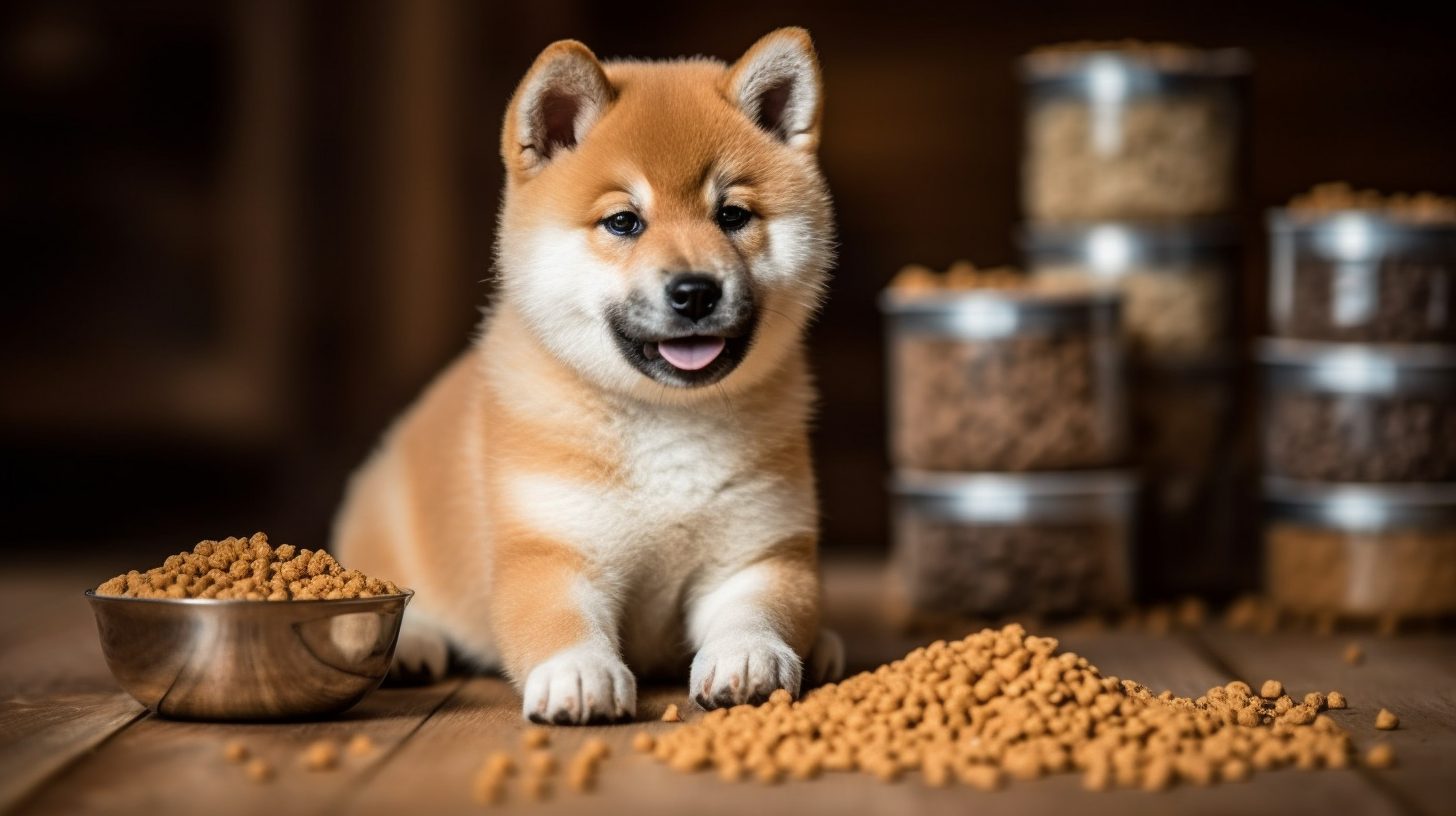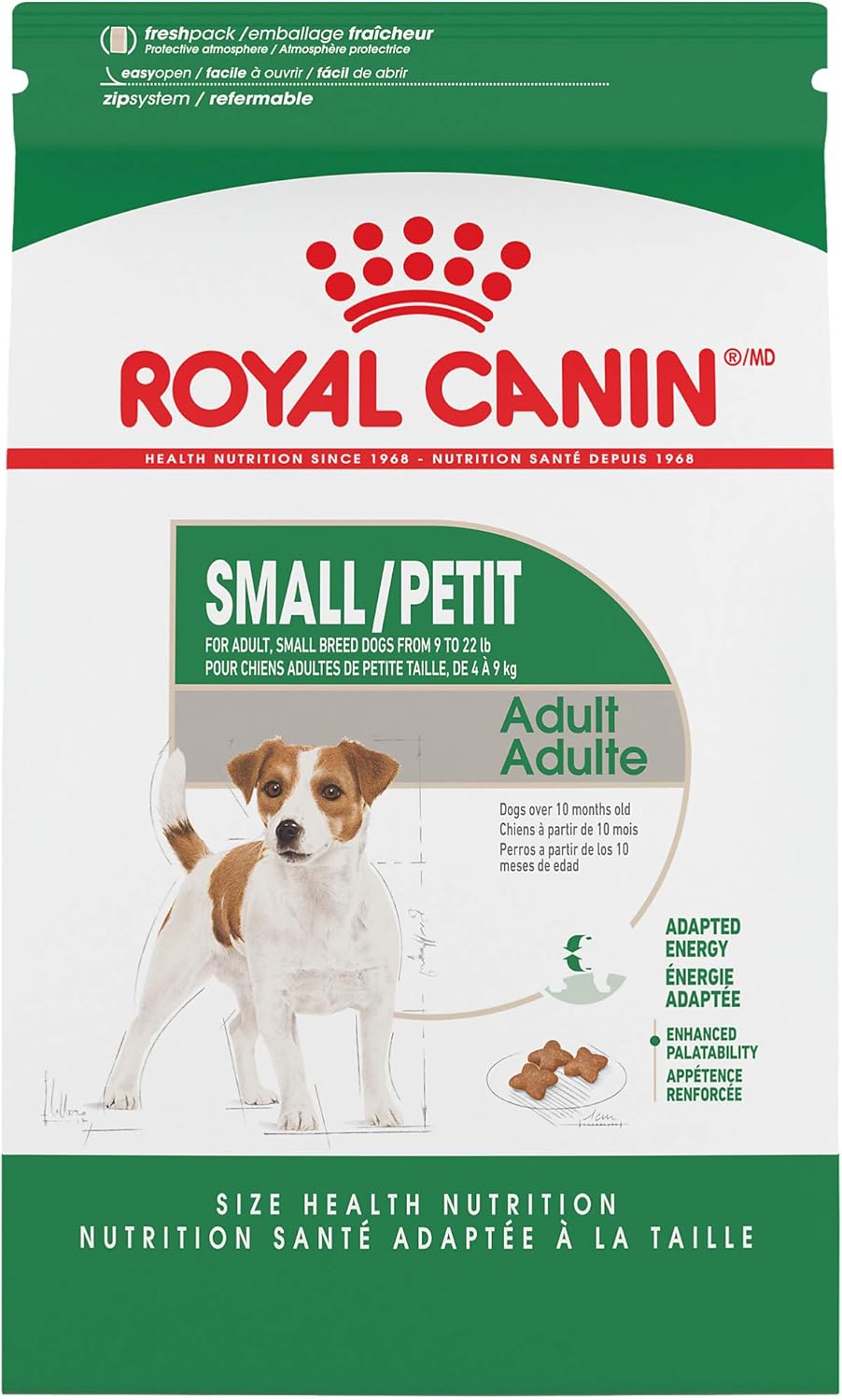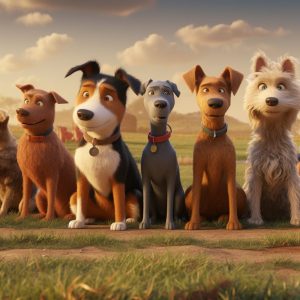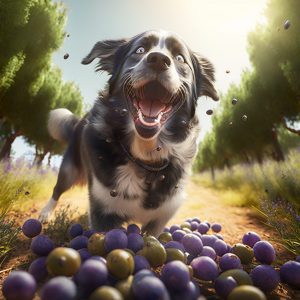
As a dog owner, you want to provide your furry companion with the best possible nutrition to keep them healthy and happy. However, with so many different dog food options available, choosing the best dog food for Shiba Inu can be overwhelming.
Click here to learn more about different types of dog food.
That’s why we’ve created this comprehensive guide to help you navigate the world of dog food and choose the best option for your Shiba Inu. From understanding your dog’s nutritional requirements to selecting high-quality ingredients, transitioning to a new food, and managing common health issues, this guide covers everything you need to know to make informed decisions about your Shiba Inu’s diet. So let’s dive in and explore the best dog food options for your beloved Shiba Inu!
Click here to learn more about different dog breeds.
Table of Contents
Our Top 3 Best Dog Food for Shiba Inu

-
Real chicken as the first ingredient
The IAMS Adult Minichunks Small Kibble High Protein Dry Dog Food has real chicken as its first ingredient, which means that it is a good source of high-quality protein for your dog.
-
Small kibble size
The small kibble size of this dog food is ideal for small-breed dogs, as it makes it easier for them to chew and digest the food.
-
Wholesome fibers and prebiotics
This dog food contains a tailored blend of wholesome fibers and prebiotics that promotes healthy digestion in dogs. This means that your dog will be able to absorb the nutrients from the food more effectively and have a healthier digestive system overall.

-
Highly digestible ingredients
The Hill's Science Diet Dry Dog Food for Small Paws is made with highly digestible ingredients that are easy on your small dog's stomach, making it an ideal option for small breed dogs.
-
Omega 6 fatty acids and Vitamin E
This dog food contains nourishing omega 6 fatty acids and vitamin E, which help promote healthy skin and a shiny coat in small breed dogs.
-
Antioxidant blend for immune support
The Hill's Science Diet Dry Dog Food uses an antioxidant blend specifically for lifelong immune support in toy and miniature dogs, helping to maintain a healthy immune system in small breed dogs.

-
Precise nutrition for small breed dogs
Royal Canin Small Breed Adult Dry Dog Food is formulated with precise nutrition specifically made for small dogs weighing 9–22 lb, between 10 months to 8 years old.
-
Weight maintenance
This dog food contains L-carnitine which helps maintain a healthy weight, while also meeting the high energy needs of small dog breeds.
-
Specialized kibble for small jaws
Royal Canin Small Breed Adult Dry Dog Food has an exclusive kibble design adapted for miniature jaws, making it easier for small dogs to chew and digest their food.
Nutritional Requirements of Shiba Inus
Click here to learn more about choosing the best dog food.
Shiba Inus have specific nutritional requirements that must be met to ensure their optimal health and well-being. Here are some key factors to consider:
Protein Requirements
Protein is essential for building and repairing tissues in your Shiba Inu’s body, including muscle tissue. Shiba Inus require a diet with a minimum of 18% protein, but ideally, their food should contain around 25% protein.
Fat Requirements
Fat is a vital source of energy for Shiba Inus, and it also helps to maintain healthy skin and coat. Shiba Inus require a diet with a minimum of 5% fat, but ideally, their food should contain around 10% to 15% fat.
Carbohydrate Requirements
Carbohydrates provide energy and fiber for Shiba Inus. However, it’s essential to choose carbohydrates that are easy for your dog to digest. Look for whole grains, such as brown rice or oatmeal, and avoid high-glycemic ingredients like corn and wheat.
Vitamin and Mineral Requirements
Shiba Inus require a variety of vitamins and minerals to maintain their overall health. This includes vitamins A, B, C, D, E, and K, as well as minerals like calcium, phosphorus, and zinc.
Caloric Requirements
The number of calories your Shiba Inu needs each day depends on their age, activity level, and overall health. On average, a Shiba Inu requires between 900 to 1,200 calories per day. It’s essential to monitor your dog’s weight and adjust its food intake accordingly to maintain a healthy weight.
Different Types of Dog Food for Shiba Inu
There are various types of dog food available on the market, and choosing the right one for your Shiba Inu can be confusing. Here are the most common types of dog food:
Dry Dog Food
Dry dog food is the most popular and convenient option for dog owners. Click here to learn more about what is dry dog food.
It’s affordable, easy to store, and has a long shelf life. Dry dog food comes in different formulas, including puppy, adult, and senior dog food.
Click here to learn more about dry dog food.
Wet Dog Food
Wet dog food contains higher moisture content than dry dog food and can be a great option for Shiba Inus who struggle to drink enough water. It’s more expensive than dry dog food and has a shorter shelf life. Wet dog food comes in cans, trays, or pouches.
Semi-Moist Dog Food
Semi-moist dog food is another convenient option for dog owners. It has a higher moisture content than dry dog food, but not as much as wet dog food. It’s more expensive than dry dog food and has added preservatives to extend its shelf life.
Freeze-Dried Dog Food
Freeze-dried dog food is a relatively new type of dog food. It’s made by removing the moisture from the food, leaving behind a dry, lightweight product that can be rehydrated with water. It’s more expensive than other types of dog food but has a long shelf life and is easy to store.
Raw Dog Food
Raw dog food is a diet that consists of uncooked meat, bones, and vegetables. It’s more expensive than other types of dog food and requires careful handling to prevent bacterial contamination. Raw dog food should only be fed under the guidance of a veterinarian.
Choosing the Best Dog Food for Your Shiba Inu
Choosing the right dog food for your Shiba Inu is crucial to their overall health and well-being. Here are some factors to consider when selecting the best dog food for your Shiba Inu:
Reading Dog Food Labels
When choosing dog food, it’s essential to read the labels carefully. Look for brands that list high-quality ingredients such as meat, fish, vegetables, and fruits, and avoid dog food that contains fillers and by-products.
Identifying High-Quality Ingredients
Choose dog food with high-quality ingredients that meet your Shiba Inu’s nutritional requirements. Look for proteins like chicken, lamb, and fish, and carbohydrates like brown rice, sweet potatoes, and peas.
Understanding By-Products and Fillers
Avoid dog food that contains by-products and fillers, which are low-quality ingredients that have little nutritional value. Examples include corn, wheat, soy, and animal by-products.
Avoiding Common Allergens
If your Shiba Inu has food sensitivities or allergies, you’ll need to avoid common allergens such as chicken, beef, dairy, and wheat. Consider a limited-ingredient diet or hypoallergenic dog food.
Choosing Age-Appropriate Dog Food
Shiba Inus have different nutritional needs at different life stages. Choose dog food that’s appropriate for your Shiba Inu’s age, whether they’re a puppy, adult, or senior.
Choosing Breed-Specific Dog Food
Some brands offer breed-specific dog food designed for specific breeds. Consider choosing Shiba Inu-specific dog food that’s tailored to your dog’s unique nutritional needs.
Considering Your Shiba Inu’s Activity Level
If your Shiba Inu is highly active, they’ll need a diet with a higher protein and calorie content. If they’re less active, choose a dog food with a lower calorie content to prevent weight gain.
Top Brands for Shiba Inus
Choosing the right brand of dog food is crucial to providing your Shiba Inu with optimal nutrition. Here are some top brands that are popular among Shiba Inu owners:
Blue Buffalo
Blue Buffalo offers a range of dog food options, including grain-free and limited-ingredient formulas. Their dog food contains high-quality ingredients like real meat, fruits, and vegetables. Blue Buffalo also offers breed-specific dog food for Shiba Inus.
Royal Canin
Royal Canin offers a range of breed-specific dog food, including a formula designed for Shiba Inus. Their dog food contains high-quality ingredients and is formulated to meet the specific nutritional needs of each breed.
Orijen
Orijen dog food is made with high-quality, biologically appropriate ingredients, and is free from grains, by-products, and artificial preservatives. Their dog food contains high protein and fat content, making it a good option for active Shiba Inus.
Merrick
Merrick offers a range of grain-free and limited-ingredient dog food options. Their dog food contains high-quality ingredients like real meat, fruits, and vegetables, and is free from artificial preservatives.
Wellness
Wellness dog food is made with high-quality, natural ingredients, and is free from artificial preservatives, colors, and flavors. Their dog food contains a balance of protein, fat, and carbohydrates, making it a good option for Shiba Inu.
Taste of the Wild
Taste of the Wild offers a range of grain-free and limited-ingredient dog food options. Their dog food contains high-quality ingredients like real meat, fruits, and vegetables, and is free from artificial preservatives. They also offer breed-specific dog food, including a formula designed for Shiba Inus.
Homemade Dog Food for Shiba Inus
Homemade dog food can be an excellent option for Shiba Inus, but it’s important to ensure that their nutritional requirements are met. Here are some factors to consider when feeding your Shiba Inu homemade dog food:
Benefits and Drawbacks of Homemade Dog Food
Homemade dog food has the advantage of being fresh and free from artificial preservatives. It also allows you to control the ingredients and quality of the food. However, it can be time-consuming to prepare, and there’s a risk of not providing your dog with all the necessary nutrients.
Ensuring Proper Nutrition with Homemade Dog Food
To ensure that your Shiba Inu’s nutritional needs are met, homemade dog food should include a balance of protein, fat, carbohydrates, and essential vitamins and minerals. It’s recommended to work with a veterinarian or canine nutritionist to ensure that the homemade dog food is nutritionally balanced.
Recipes for Homemade Dog Food
If you’re interested in making homemade dog food, there are many recipes available online or in books. Look for recipes that use high-quality ingredients like lean proteins, whole grains, and vegetables. Some popular homemade dog food ingredients include chicken, turkey, brown rice, sweet potatoes, and green beans.
Transitioning to a New Dog Food
Transitioning your Shiba Inu to new dog food can take time and patience to avoid digestive upset. Here are some factors to consider when transitioning your Shiba Inu to a new dog food:
Reasons for Transitioning
There are various reasons why you may need to transition your Shiba Inu to a new dog food, such as changing their life stage or addressing health issues. It’s essential to transition your dog gradually to avoid digestive upset and ensure a smooth transition.
The Transition Process
When transitioning your Shiba Inu to a new dog food, it’s recommended to do so gradually over a period of 7-10 days. Start by mixing a small amount of the new dog food with their current food and gradually increase the amount of new food each day while decreasing the amount of the old food.
Common Problems During the Transition
Some common problems that can occur during the transition process include diarrhea, vomiting, and loss of appetite. If your Shiba Inu experiences any of these symptoms, slow down the transition process and give them time to adjust to the new food. If the symptoms persist, consult your veterinarian.
How to Feed Your Shiba Inu
Feeding your Shiba Inu is an important part of their daily routine. Here are some factors to consider when feeding your Shiba Inu:
Meal Frequency
Shiba Inus should be fed twice a day, with a gap of 8-12 hours between meals. This helps to regulate their digestion and prevent hunger pangs.
Portion Control
It’s essential to feed your Shiba Inu the right amount of food to prevent obesity and other health issues. Use the feeding guidelines on the dog food label as a starting point, and adjust the portion size according to your Shiba Inu’s weight, activity level, and overall health.
Free Feeding vs. Scheduled Feeding
Free feeding refers to leaving food out all day for your Shiba Inu to eat as they please. This method is not recommended, as it can lead to overeating and obesity. Scheduled feeding involves feeding your Shiba Inu at specific times each day, and it’s a better option for portion control and maintaining a healthy weight.
Mealtime Routine
Establishing a mealtime routine can help your Shiba Inu feel more secure and reduce the likelihood of food-related behavior problems. Choose a quiet and calm feeding location and avoid feeding your Shiba Inu immediately before or after exercise. Also, provide fresh water at all times to keep your Shiba Inu hydrated.
Common Health Issues in Shiba Inus
Like all dog breeds, Shiba Inus are prone to certain health issues. Here are some common health issues that Shiba Inus may experience:
Allergies
Shiba Inus can develop allergies to food or environmental factors such as pollen or dust. Common signs of allergies include itching, sneezing, and skin irritation. If you suspect that your Shiba Inu has allergies, consult your veterinarian.
Hip Dysplasia
Hip dysplasia is a genetic condition that affects the hip joints of dogs, causing pain and mobility issues. Shiba Inus are prone to hip dysplasia, so it’s essential to monitor their mobility and seek veterinary care if you suspect any problems.
Patellar Luxation
Patellar luxation is a condition where the kneecap dislocates from its normal position, causing pain and mobility issues. Shiba Inus are prone to patellar luxation, so it’s essential to monitor their mobility and seek veterinary care if you suspect any problems.
Eye Problems
Shiba Inus are prone to eye problems such as cataracts, glaucoma, and progressive retinal atrophy. It’s essential to monitor your Shiba Inu’s eyesight and seek veterinary care if you notice any problems.
Dental Issues
Shiba Inus are prone to dental issues such as periodontal disease, which can cause tooth loss and other health issues. It’s essential to provide your Shiba Inu with regular dental care, including brushing their teeth and regular dental cleanings by a veterinarian.
Obesity
Shiba Inus can be prone to obesity, especially if they’re not given enough exercise or are overfed. It’s essential to monitor your Shiba Inu’s weight and provide them with regular exercise and a balanced diet to prevent obesity and other health issues.
Conclusion
Choosing the best dog food for your Shiba Inu can be overwhelming, but by understanding their nutritional requirements and considering factors like high-quality ingredients, age-appropriate food, and breed-specific options, you can make an informed decision. It’s important to transition your Shiba Inu to a new dog food gradually, establish a mealtime routine, and monitor their weight and health for any potential issues. By providing your Shiba Inu with a balanced and nutritious diet, you can help ensure their overall health and well-being for years to come.
FAQs About Best Dog Food for Shiba Inu
When choosing dog food for your Shiba Inu, look for high-quality ingredients like real meat, whole grains, and vegetables. Avoid dog food that contains by-products and fillers, which have little nutritional value. Choose dog food that’s appropriate for your Shiba Inu’s age and activity level.
Both dry and wet dog food can be suitable for Shiba Inus, depending on their preferences and nutritional needs. Dry dog food is convenient, affordable, and has a long shelf life. Wet dog food contains higher moisture content, which can be beneficial for Shiba Inus who struggle to drink enough water.
Yes, homemade dog food can be a suitable option for Shiba Inus, but it’s important to ensure that their nutritional requirements are met. Work with a veterinarian or canine nutritionist to ensure that the homemade dog food is nutritionally balanced.
The amount of food your Shiba Inu needs depends on their weight, age, and activity level. Use the feeding guidelines on the dog food label as a starting point, and adjust the portion size accordingly.
Shiba Inus are prone to certain health issues such as allergies, hip dysplasia, patellar luxation, eye problems, dental issues, and obesity. It’s essential to monitor your Shiba Inu’s health and seek veterinary care if you suspect any problems.




One Response